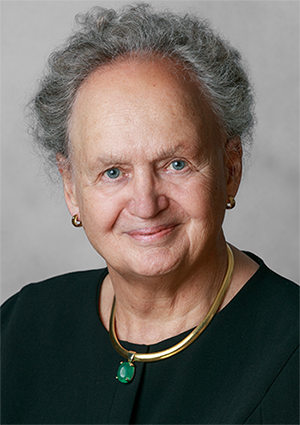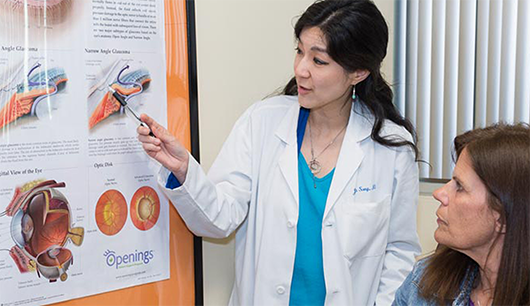Download PDF
WHAT’S HAPPENING
This Year’s Laureate: Irene H. Maumenee, MD
The Board of Trustees of the Academy is proud to announce Irene H. Maumenee, MD, as the recipient of the Laureate Recognition Award for 2017. She is currently the director of ocular genetics as well as a research professor for pediatric ophthalmology and adult strabismus at the University of Illinois College of Medicine at Chicago.
Focusing on genetics. Dr. Maumenee’s most significant contributions to ophthalmology are the introduction of formal genetic concepts to the field of eye care and the creation of ophthalmic genetics as a subspecialty in the United States. Her clinical and research interests focus on the classification and management of hereditary ocular diseases, population genetics, molecular genetics, and rare genetic diseases. As the field of molecular genetics evolved in the 1980s, she merged clinical studies of genetic eye diseases with laboratory investigations, the first of such efforts to combine the 2. Dr. Maumenee was a research fellow in ophthalmology and genetics at the University of Geneva Medical School in Switzerland, completed postdoctoral fellowships in genetics at the University of Hawaii and Johns Hopkins University School of Medicine, and completed an ophthalmology preceptorship from Wilmer Eye Institute at Johns Hopkins Hospital. She is 1 of 6 board-certified ophthalmologists in the world who are also board-certified in medical genetics.
From the ground up. In order to spread the message about the importance of genetics in ophthalmology, Dr. Maumenee began the Ophthalmic Genetics Study Club in 1977, which, 10 years later, became known as the International Society for Genetic Eye Diseases and Retinoblastoma. While at Wilmer, Dr. Maumenee founded and directed the Johns Hopkins Center for Hereditary Eye Diseases, an international referral program that has evaluated, diagnosed, and treated more than 30,000 patients with rare eye diseases. More recently, she helped establish an ophthalmic genetics center at the University of Illinois Eye and Ear Infirmary in Chicago.
A lifetime of achievement. Dr. Maumenee has received a number of medals and awards in ophthalmology, including the Suzanne Véronneau-Troutman Award from Women in Ophthalmology in 2005, the Deutscher Marfan-Preis from the German Marfan Association in 1995, the Marion Spencer Fay Award from the Drexel University College of Medicine in 1993, and the Antoine Marfan Award from the National Marfan Foundation in 1989. She has also coauthored more than 300 journal articles and is the section editor for birth defects and genetic diseases for the British Journal of Ophthalmology.
Honored in New Orleans. In recognition of Dr. Maumenee’s contributions, the Academy will honor her as the 2017 Laureate during the Opening Session of AAO 2017.
At AAO 2017, read an interview with Dr. Maumenee in AAO 2017 News, a convention tabloid distributed onsite in New Orleans.
 |
|
ACADEMY LAUREATE: IRENE H. MAUMENEE, MD. The Laureate Recognition Award honors physicians who have made the most significant contributions to ophthalmology leading to the prevention of blindness and restoration of sight worldwide.
|
TAKE NOTICE
EyeCare America: Give Back to Your Community
The Academy’s EyeCare America (ECA) program has helped nearly 2 million people since its inception in 1985, and it is one of the largest public service programs in American medicine. Approximately 2,000 of ECA’s current volunteers have been with the program since it began and will, naturally, be retiring, thus reducing access to care for underserved populations. To mitigate this, the Academy urges the next generation of members to participate in ECA. The commitment is minimal—ECA volunteers see only 2 to 4 patients on average per year.
One patient’s story. Christine Chapman knew she was at risk of developing glaucoma, and when her vision began to fail she was fortunate enough to be connected via the ECA with Julia Song, MD, for a glaucoma screening. Dr. Song diagnosed her with narrow-angle glaucoma and told her she needed surgery immediately. Dr. Song helped Ms. Chapman navigate the health care system to determine the best path to treatment, resulting in surgery 6 weeks later. “I am so grateful for EyeCare America. Just to know I could get an exam meant I could get a move on treating this disease,” said Ms. Chapman.
Read the full story about Ms. Chapman and Dr. Song at “Timely Glaucoma Diagnosis Prevents Woman's Blindness.”
Sign up to volunteer at aao.org/eyecare-america/volunteer-ophthalmologists.
 |
|
ECA GIVES A HELPING HAND. “There are so many health care programs out there that are difficult for patients to navigate. But EyeCare America can help people who are lost,” said Dr. Song (left) with Ms. Chapman.
|
The Foundation’s 2016–2017 Annual Report
Thanks to donor support, the Academy Foundation has funded several educational, quality of care, and service programs that are among the most innovative in all of medicine. Read the Foundation’s latest annual report, Together, We’re Making a Difference, to learn about the impact of the following initiatives:
- The $500,000 donation from Stanley M. Truhlsen, MD, and Dorothy Truhlsen will support state-of-the-art simulation and interactive learning technology for the ONE Network’s subspecialty centers.
- The upcoming launch of the David E.I. Pyott Glaucoma Education Center and additions of lectures, videos, and interactive training exercises are keeping the ONE Network at the forefront of ophthalmic education.
- The IRIS Registry’s continued development allows physicians to assess their quality of care and eases regulatory compliance. It has helped Academy members avoid an estimated $66 million in penalties in 2017.
- The Education Distribution Project helped close the learning gap with donations of more than 225 sets of the Basic and Clinical Science Course to ophthalmology residency programs in developing nations.
- ECA volunteers continue to serve their community with sightsaving screenings. For an example, see Ms. Chapman’s story in “EyeCare America: Give Back to Your Community” above.
- The museum’s exhibit, “History of Ophthalmology in the Asia Pacific,” traced historical evidence through the 18th century in 4 countries linked by the famous Silk Road and premiered at AAO 2016 in Chicago.
View the report at aao.org/foundation.
Two Deadlines for MIPS—Oct. 2 and Oct. 31
If you are participating in the Merit-Based Incentive Payment System (MIPS), you should be aware of 2 upcoming deadlines.
Start your 90-day performance period no later than Oct. 2. CMS has designated Oct. 2 as the last day to start participating in MIPS and satisfy the minimum 90-day performance period for the 3 performance categories that contribute to your final score—quality, advancing care information (ACI), and improvement activities.
Why you should start earlier than Oct. 2. An earlier start date would give you some leeway in case you have any initial problems with your MIPS procedures. Furthermore, you may get a higher quality score if your performance period for quality is more than 90 days. This is because (1) you will boost your chances of meeting a quality measure’s case minimum threshold of 20 cases and (2) for some quality measures a longer performance period may bolster your performance rate.
Sign up for the IRIS Registry web portal by Oct. 31. You can use the IRIS Registry web portal to manually report quality measures, ACI measures, and improvement activities. (Note: If you have already signed up for IRIS Registry, including for EHR integration, you don’t need to sign up again for the web portal.)
Download EyeNet’s MIPS Manual 2017.
Ask the Ethicist: Written Agreement in Comanagement Arrangements
Q. Upon reviewing the revised Comprehensive Guidelines for the Comanagement of Ophthalmic Postoperative Care, one of my colleagues interpreted the phrase “written agreement” to mean that the Academy recommends that the operating ophthalmologist draft a general contract explaining his comanagement policy, and that this contract be distributed to and signed by all comanaging providers. However, I interpret the phrase to refer to the well-established CMS requirement for a documented transfer of care with the patient’s information, details of surgery, transfer date, etc., that is supposed to occur with every comanaged case. Which of these interpretations is correct?
A. Your colleague’s interpretation is correct. The ideal documentation suggested in the Comprehensive Guidelines includes written consent between the operating surgeon and the comanaging provider and a document stating that the patient consents to the arrangement. Additionally, the CMS requirements for transfer of care documentation must still be met, independent of the guidelines. Please note that the recommended written agreement is not a requirement enforced by the Academy nor are the guidelines part of the Academy’s Code of Ethics, although Rules 7 and 8 address ethics rules that apply to comanagement and postoperative care.
For more information, see Rules 7 and 8 of the Code of Ethics.
ACADEMY STORE
Study for MOC on Your Own Schedule
Efficiently prepare for maintenance of certification (MOC) with on-demand recordings of the live Academy MOC Exam Review Course. The course’s on-demand format provides the full slide and audio content in an easy-to-use, searchable format. There are 11 full-day sessions to choose from, covering core ophthalmic knowledge and all practice emphasis areas, each containing 6 to 9 hours of instruction.
For more information and to purchase, visit the Academy Store.
Gain Business Savvy From 1-Hour Webinars
Get expert instruction on running an efficient and profitable practice from the Academy and AAOE’s monthly webinars. Upcoming webinars include the following:
- Sept. 12—Use RVUs to Quantify the Value of Your Clinic’s Services
- Oct. 10—Recruit, Train, and Retain Qualified Technicians
- Dec. 7—Effectively Manage Your Millennial Physicians and Staff
- Jan. 16—2018 Ophthalmology Coding Update
Save up to 40% when you sign up for 2 or more practice management webinars. As a live webinar registrant, you will also receive the recording at no extra charge.
Register for upcoming webinars or order recordings of past presentations at the Academy Store.
Connect With Retina Luminaries at AAO 2017
Join Andrew P. Schachat, MD, editor-in-chief of Ophthalmology Retina, Stephen D. McLeod, MD, editor-in-chief of Ophthalmology, and other well-known experts at an exclusive event.
Subscribe to Ophthalmology Retina to receive your invitation. Visit the Academy Store or call (866) 561-8558 (U.S. only) or +1 (415) 561-8540, 8:00 a.m.-5:00 p.m. PST, Monday through Friday.
D.C. REPORT
Quality Program Relief in Proposed 2018 Physician Fee Schedule
The Academy’s push for regulatory relief for ophthalmologists is gaining traction via policy changes included in Medicare’s 2018 proposed physician fee schedule. In setting its payment requirements for the upcoming year, the Centers for Medicare & Medicaid Services (CMS) included the following:
- Significant changes to current quality program penalties, including a 50% reduction in value-based modifier penalties.
- Fewer required Physician Quality Reporting System (PQRS) quality measures. As a result, we expect many more ophthalmologists to avoid penalties for this program’s final payment year. This is a significant win for ophthalmology. (Your PQRS performance in 2016, which was the program’s final performance year, impacts your payments in 2018.)
- A 0.28% increase of the physician conversion factor. Physicians had been slated for a 0.5% update via the Medicare Access and Children’s Health Insurance Program Reauthorization Act of 2015. However, this was reduced by 0.22% because CMS was not able to reach congressionally mandated misvalued code targets.
- An acceptance of all revised work values proposed by the Academy and the AMA Relative Value Scale Update Committee.
The Academy is leading an extensive campaign to reduce quality-program requirements and cut value-based modifier penalties. Our coalition’s push for regulatory relief (with help from the AMA) specifically targeted PQRS and the value-based modifiers—their flaws are too significant for CMS to ignore.
CMS will release a final version of its fee schedule in November, which will account for comments made by the Academy and other medical organizations.
For up-to-date information, visit aao.org/advocacy.